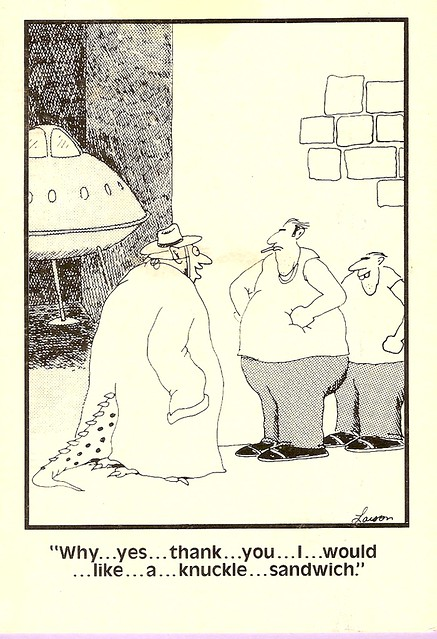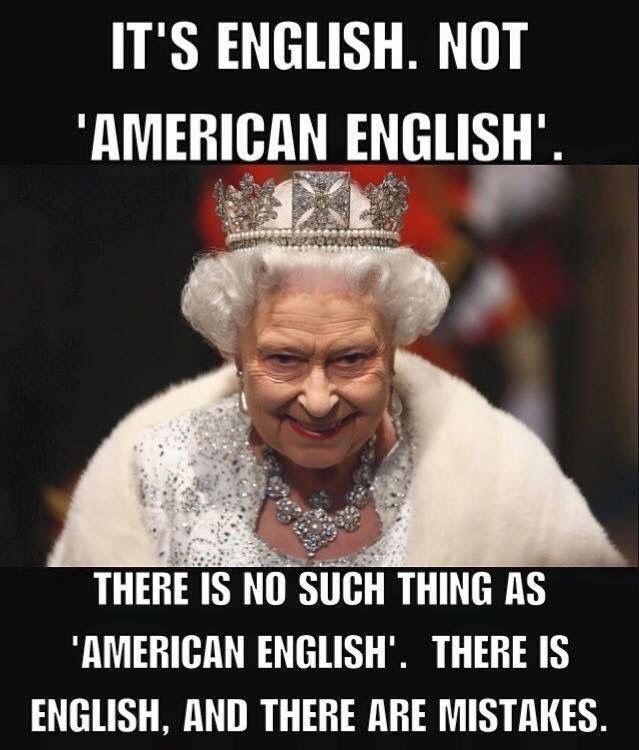pet peeves
-
Once, in Scotland, I went from men's shop to men's shop looking for some suspenders. I was met only with quizzical and cautious looks. Finally, I was pointed to a women's lingerie shop, where I found out that suspenders in English meant garter belt in American! I guess they must've thought that I left my goat back at the hotel.

-
@Kehaulani "Braces" or even "galluses". My grandfather used the latter term which I always thought was just really old fashioned. But I now find it is actually a Scottish term.
-

-
Meh, nuanced, iconic, curated.
-
@Curlydoc Also, use of looking as a present participle.
-
-
Spoken like a true Brit!
-
I love how they will call it "The Queen's English," as if it belonged to her since birth. Sometimes I love the classiness of British culture. Out here, though, it's a little more Wild Wild West. This is 'Murica after all. We like whiskey, guns and cattle.
-
For ever and ever, it was "The King's English." But the old joke during the reign of George VI was that the queen's english was much better than the king's.
-
@Kehaulani said in pet peeves:
Once, in Scotland, I went from men's shop to men's shop looking for some suspenders. I was met only with quizzical and cautious looks. Finally, I was pointed to a women's lingerie shop, where I found out that suspenders in English meant garter belt in American! I guess they must've thought that I left my goat back at the hotel.
Americans just get it so wrong, but also so right
-
@Peter-Mac said in pet peeves:
@Kehaulani said in pet peeves:
Once, in Scotland, I went from men's shop to men's shop looking for some suspenders. I was met only with quizzical and cautious looks. Finally, I was pointed to a women's lingerie shop, where I found out that suspenders in English meant garter belt in American! I guess they must've thought that I left my goat back at the hotel.Americans just get it so wrong, but also so right
I would give you a like on this but I don't know if I could stand all the S^&t I might take!
-
@administrator said in pet peeves:
In software, a "union" is a specific data type.
In the world of databases, "union" also represents two queries that join together to form a single data set.
As for English...
Oh dear! Look at the deer, dear! Aren't they dear deer, dear?
I before e, except after c....
except when your sleight of hand foreign neighbor Keith receives eight beige counterfeit sleighs from feisty caffeinated weightlifters...
or
when you heinously seize that conceited heifer from the ceiling.
Weird.
-
I call it "The Queen's English" because, well, there's a Queen now. When there's a king, I'll call it "The King's English".
As an aside, I have long felt that Queen Elizabeth is determined to outlive Prince Charles, so that he will never be King. Just my jaundiced, cynical opinion....
-
@Kehaulani said in pet peeves:
English is an inconsistent language, just ask a non-English speaker, trying the learn it. Getting frustrated over it is a waste of time.
Disagree. English is not inconsistent. Now, to say this properly, English is consistent. Any language must be consistent, lest no two people could communicate at any time. I surmise you mean to say English is irregular, which is true.
-
@moshe said in pet peeves:
Dictionary says that "judgment" is the correct spelling,
although 50 years ago "judgement" would have been the correct spelling.We "must" drop that "e" before the "-ment".
But for "management" we are "required" to keep that "e" before the "-ment".
And for "encouragement" we are "required" to keep that "e" before the "-ment".
Why the change for "judgement" / "judgment"?
If enough stupid people spell a word incorrectly for a long enough period of time,
then the publishers of the dictionaries finally give in and change the official spelling "due to evolution of the spelling by the general population".That is also how "bad" came to mean "good" in American urban slang 50 years ago.
Society is going to heck in a hand-basket.
Now I just have 9,999 other pet peeves to post...
Such as countless people on TV who say, "He talked to you and I".
They apparently did not have to graduate from 3rd grade to become a TV writer or TV host or TV reporter.moshe
Specifically, in proper English, the e is retained in judgement.
Americans have prided themselves over the past 100 years to modify true English into something else. In some cases, such as the writings of Mark Twain, the modifications were deliberate and the result of a sharp intellect. But what has passed since for good language has been the result of ignorance and poor, average education.
You will be very hard pressed today to find people who know the difference between lay and lie, or who and whom.
You will hear, every day, every where, the phrase "on a daily basis". I wager, perhaps only 2 people on this site will know this is the poorest form of grammar and why.
Confused language stems from confused thinking, or no thinking at all. Nothing displays poor education and low intelligence more sharply than poor language ability. This bodes ill for the future of any country.
-
"Lay" is a verb indicating a certain position our body is in. "Lie" is either a verb or noun that describes telling something that is not completely true.
"Who" is used as subject, "whom" is used as object. I didn't even have to search those things!
-
I thought "lay" was a noun while 'lie" was a verb.

-
-
Unnhhh... According to the "Manual of Style" on my bookshelf....
- Lay (verb) means "to put in place." It must have an object. (Example: "The contractor promised to lay the sod before the rains began.")
- Lie (verb) means "to rest or recline." It cannot have an object. (Example: "The main plant entrance lies south of the personnel building.")
- Lie (verb) second meaning: "to intentionally utter a falsehood."
- Lie (noun) means: "a knowingly false statement."
Or, as I learned it many years ago in school: "You should lay the baby down for a while. If he can lie still for a few minutes, he might feel better."
-
Uh, dudes, my double entendre is still flying overhead. I know the grammatical difference. That was a joke.
